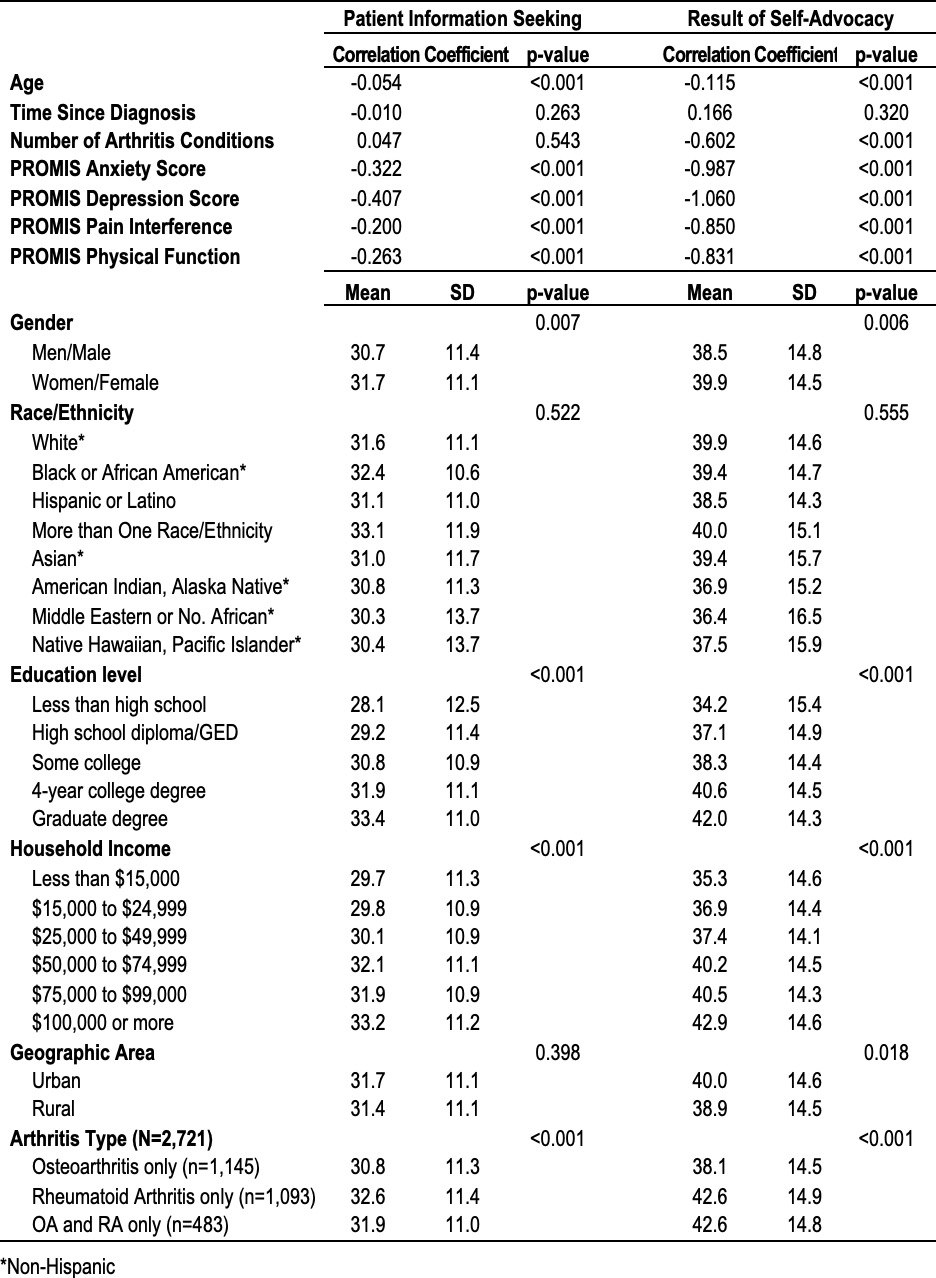Session Information
Date: Friday, November 6, 2020
Title: Patient Outcomes, Preferences, & Attitudes Poster I: RA, Spondyloarthritis, & OA
Session Type: Poster Session A
Session Time: 9:00AM-11:00AM
Background/Purpose: The purpose of this study is to understand experiences of empowerment in healthcare visits among US adults with arthritis, and key factors associated with discrepancies in empowerment, including sociodemographics and patient-reported health outcomes.
Methods: Data were collected through online surveys of a convenience sample of adults with arthritis in the United States from March 2019 to March 2020 through the Arthritis Foundation’s LiveYes! INSIGHTS program. The primary outcome, patient empowerment, was measured by two domains of the Health Care Empowerment Questionnaire (HCEQ): Involvement in Decisions (6 items) which we call Patient Information Seeking, and Involvement in Interactions (8 items) which we call Result of Self-Advocacy. Additional patient-reported outcomes were measured using the PROMIS-29® and sociodemographic data were collected. We analyzed surveys in which individuals had seen a doctor in the last 6 months, completed all HCEQ items, and provided key demographics. We tested for association between the dependent variables (Patient Information-Seeking and Result of Self-Advocacy) and independent variables using one-way Analysis of Variance (gender, race, education, income, rurality, arthritis type) or simple linear regression (age, number of arthritic conditions, years since diagnosis, and PROMIS-29 subscales) with the dependent variables (HCEQ scales). P-value < 0.050 was considered statistically significant; between groups, ≥10% differences in means of HCEQ scores were considered meaningful.
Results: 8,193 surveys were analyzed. Lower HCEQ scores for both Patient Information-Seeking and Result of Self-Advocacy were significantly and meaningfully associated with higher age (r2=0.005, p< 0.001 and r2=0.012, p< 0.001), lower educational attainment (F(4, 8188) = 29.39, p< 0.001, and F(4, 8188) = 31.47, p< 0.001), and lower income (F(5, 7543) = 21.73, p< 0.001, and F(5, 7543) = 44.55, p< 0.001), Respondents’ HCEQ scores did not differ significantly and/or meaningfully based on gender, race, geographic area, time since diagnosis, or number of arthritic conditions (p >0.050). Respondents with Osteoarthritis (OA) only (compared to those with Rheumatoid Arthritis (RA) only or OA and RA only) reported significantly and meaningfully lower Result of Self-Advocacy (F(2, 2718) = 30.97, p< 0.001); their Patient Information-Seeking was significantly but not meaningfully lower (F(2, 2718) = 7.01, p< 0.001). Result of Self-Advocacy had a strong negative correlation with PROMIS subdomains of Anxiety (r2=0.012, p< 0.001), Depression (r2=0.022, p< 0.001), Pain Interference (r2=0.007, p< 0.001), and Physical Function (r2=0.010, p< 0.001); each of these domains had weak to moderate negative correlation with Patient Information-Seeking.
Conclusion: Results of Self-Advocacy was lower among those who were older, less educated, lower income, more anxious, more depressed, experiencing greater pain, or better physical function. Similar but muted trends were seen for patient information-seeking. The differences between patient information seeking and self-advocacy indicate that while patients may feel comfortable seeking information, they may still have unmet needs.
 Figure 1. Health Care Empowerment Questionnaire Subdomains
Figure 1. Health Care Empowerment Questionnaire Subdomains
To cite this abstract in AMA style:
Carluzzo K, Knight-Zhang E, Schifferdecker K, Creek E, Butcher R, Eakin G. Age, Income, Education, and Health Conditions Are Associated with Patient Empowerment Among US Adults with Arthritis, but Race and Geography Are Not [abstract]. Arthritis Rheumatol. 2020; 72 (suppl 10). https://acrabstracts.org/abstract/age-income-education-and-health-conditions-are-associated-with-patient-empowerment-among-us-adults-with-arthritis-but-race-and-geography-are-not/. Accessed .« Back to ACR Convergence 2020
ACR Meeting Abstracts - https://acrabstracts.org/abstract/age-income-education-and-health-conditions-are-associated-with-patient-empowerment-among-us-adults-with-arthritis-but-race-and-geography-are-not/


